Fathers to the fore with new “Gandy Bagpipes” by McCallum Bagpipes
![The Gandy Bagpipe mounted in imitation ivory and chased silver. [Photo John Slavin]](https://www.pipesdrums.com/storage/2025/06/McCallum_Gandy_pipes_01.jpg)
Father’s Day 2025 is the perfect time to officially announce the new “Gandy Bagpipe” by McCallum Bagpipes, an exact reproduction of the 1939 instrument played for many years by Ray Gandy in Victoria, British Columbia, then by Bruce Gandy and, most recently, by Alex Gandy.
That makes three generations of Gandy dads who have enjoyed the vintage instrument. The pipes have brought some of the greatest prizes in solo piping to both Bruce and Alex, including the Highland Society of London Gold Medals, the Glenfiddich MSR, Silver Star Former Winners MSRs at the Northern Meeting, the Bratach Gorm, and dozens of other prestigious awards.
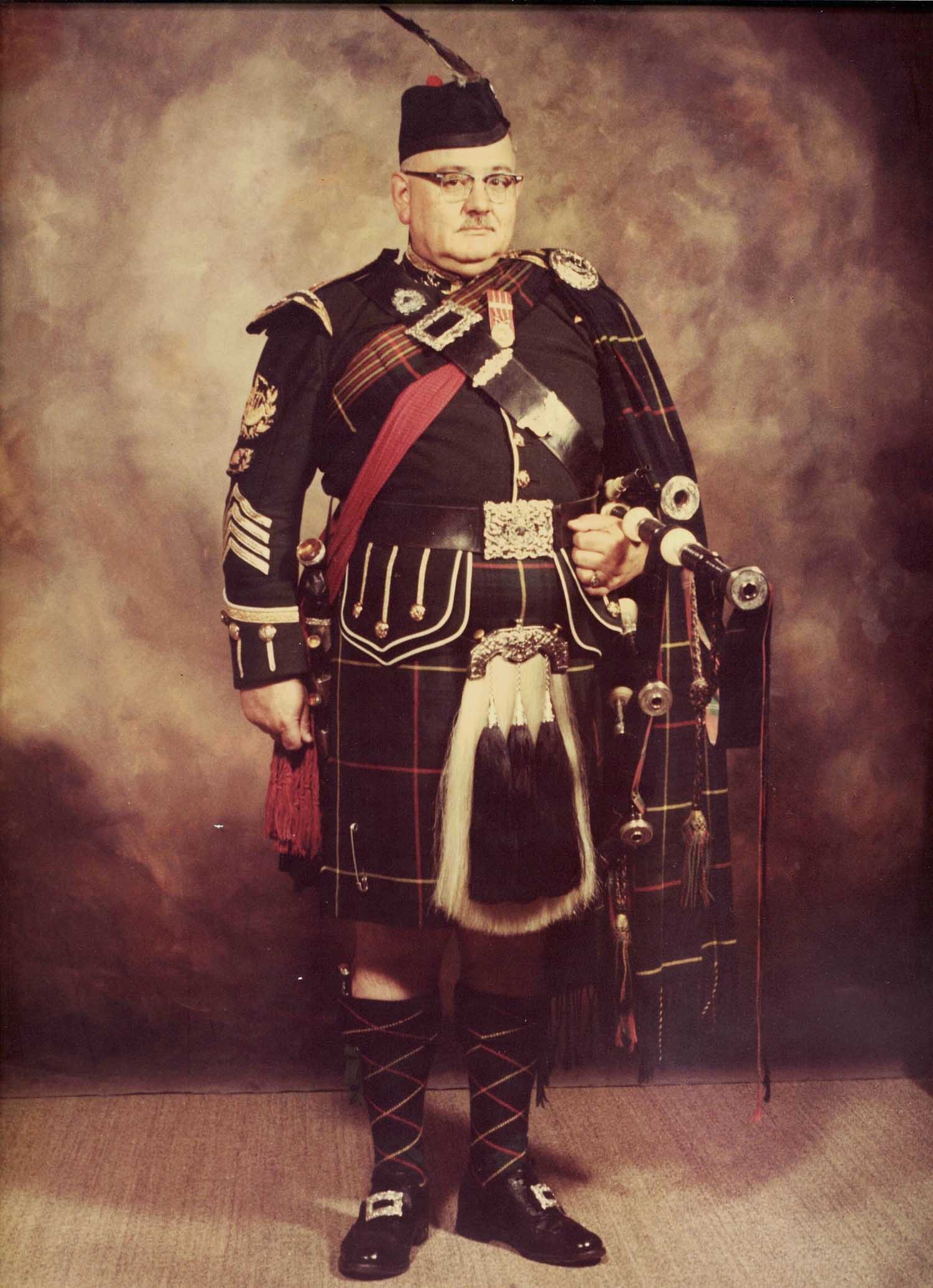
While reproduction sets are now familiar, the Gandy Bagpipe is a novel concept in that it’s likely the first instrument modelled after a bagpipe passed through three generations of competing pipers. Not only that, but the drones complement the Gandy Pipe Chanter, also made by McCallum under design consultation with both Bruce and Alex.
The pipes will be available through McCallum’s worldwide network of bagpipe dealers, who can set their own pricing. The pipes come in almost any configuration of mounts and materials that a piper prefers, and pricing will be approximately $1,800 to $4,000, depending on mounts and materials (excluding sterling silver).
It’s a novel and newsworthy concept, driven by the heirloom quality of a single 1939 bagpipe.
We connected with Bruce and Alex Gandy (and a cameo appearance by baby Malcolm, who might one day have to fight his older brother, Colin, and his younger twin sisters for the heirloom pipes) for a video chat about the new Gandy Bagpipes, the history of the original instrument, background and stages of the project, and the potential for new and experienced pipers who choose to acquire their own future heirloom pipes.
Here’s the full text of our discussion, with more edits for clarity.
pipes|drums: Today is Father’s Day 2025, and we are really pleased to be here with Alex Gandy, Bruce Gandy and little Malcolm Gandy – three generations of Gandys. Since it’s Father’s Day today, we are helping to launch the new Gandy Bagpipe that Alex and Bruce have put together with McCallum Bagpipes in Kilmarnock, Scotland. Thanks for taking the time to meet today. Tell us about the new pipes.
![Alex Gandy with his grandfather, Ray Gandy's 1939 bagpipe. [Photo Derek Maxwell]](https://www.pipesdrums.com/storage/2025/06/Gandy_Alex_2018.jpg)
Having a family heirloom, always having that pressure, and knowing that anything could happen, it just wasn’t worth it. The pipes are particularly good, so why don’t we talk to McCallum and see if they want to get involved? We already had the Gandy chanter.
Kenny MacLeod always said the chanter is the hard part. If you’ve already got that going, let’s see if we can make these pipes. And it can happen quite quickly.
pipes|drums: It’s a different concept. Bruce, how did your dad originally come to acquire the pipes?
Bruce Gandy: It’s a good story. I came from a large family of eight. My dad was coming up at that time to be pipe-major of the Canadian Scottish regiment in Victoria, British Columbia. He’d been there since 1939 when he joined as a cadet and started the cadet band.
My first set of pipes was a loaner pipe from there, but he acquired one of six sets that came over in 1939 from Scotland, some silver, some silver and ivory, others with no mounts.
A famous set, I call it famous because it was Hal Senyk’s. He played his with Muirhead & Sons. But they were famously stolen and missing for 25 years, but Hal found them at a flea market one day. Being a lawyer, he told the guy, By the way, these are mine, and we can make this really easy right now. I think he bought the guy lunch and coffee for taking good care, they were in the same box, reeds and everything he’d had in that box 25 years back.
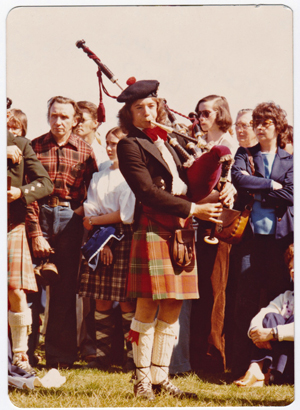
I’m going to say my dad probably took a loan out from someone or paid $300 over time for this silver and ivory instrument that he played until his early passing in the early 1970s. Of course, they came to me, and I remember getting them on my first lesson after Christmas. He passed on the 20th, and then we started up the second or third week in January. Jamie Troy [Bruce’s teacher] said, Where are the pipes? He says, Let’s get them going. They’re yours to play.
It was mystical for me. I was 14. I didn’t know if I should be playing them yet. What’s the appropriate amount of time to let pipes mourn their old owner? I had no idea. He said, “No, it’s time for you to get them going.”
We played them a half-dozen times they were at the house. Sometimes I’d be downstairs playing, and I’d see his pipes there. I’ll have a crack at these, too. I always remember them at that time being heavy compared to just the ivory setup that were a little set from the band on loan to me.
I came to my dad’s pipes at that point and played them for 35 years. When I turned 50-ish, I thought it was getting close that Alex should have a really good set to play to try to win some of these major prizes. I was on the lookout for something lighter. The pipe was still fantastic, and I could still hear, as I got better at it, the pipes got better, the pipe got better on its own It’s one of those things, when wood is good and it ages, it chooses to get better.
I’ve had some great comments over the years, people saying the pipe was good to start, but it was better at the end. I don’t know how that happens. It’s just awesome.
“Growing up, I always knew the pipes were important. We joked, ‘If there’s ever a fire, you grab the passports, you grab the pipes. The other stuff we can replace.'” – Alex Gandy
pipes|drums: You feel the pipes improve as you go along? Is that what makes them particularly special? Obviously, they’re an heirloom instrument, but they have this quality.
Alex Gandy: Growing up, I always knew the pipes were important. We joked, “If there’s ever a fire, you grab the passports, you grab the pipes. The other stuff we can replace.”
It was always, well, Mom and Dad say these pipes are good, and everybody else says they’re good, so they must be good. I noticed the difference after I started playing them, which I think was in 2014. I was playing an old set of MacDougalls, my mom’s father’s pipes. I’m happy to be the curator of both sets. But the MacDougalls were just a little bit more petite, whereas
Grandpa Ray’s pipes make a statement when you blow up and they’re going really well when you enter the room. It’s undeniable. It’s like, wow, that’s a really top instrument. And as recently as 2023, at the Glenfiddich, Willie McCallum and Angus MacColl took me aside separately and told me just how good they thought these pipes were. I mean, it’s the Glenfiddich; nobody’s got bad pipes, but to have those guys telling you they thought they were really good, that was what’s given me the confidence to approach Kenny MacLeod and Stuart McCallum about this. I knew that the rumours were true. All the things I grew up thinking I knew. Having guys like that tell you that they think your pipes are really great, that went a long way for me.
![Glenfiddich Championships, 2023 [Photo Derek Maxwell]](https://www.pipesdrums.com/storage/2023/10/Glenfiddich_2023_Derek_Maxwell.jpg)
Bruce Gandy: That was a lucky trip for me, in that the only way to do this was to get him the pipes. And while the whole sort of worry or paranoia, call it, I just wasn’t. Neither of us was comfortable with Purolating the pipes over.
I went to Scotland during Celtic Connections in January, bringing the pipes with me, hoping that there’d be no trouble. I met with Stuart, and it took him four to five days to take every possible measurement, photograph, and X-ray so that they could have the pipe exactly the same, as close as they could make. Once I left, it would be harder if we forgot about something as simple as a ring cap.
![Gandy Pipes with plain ferrules, slides and a Gandy chanter. [Photo John Slavin]](https://www.pipesdrums.com/storage/2025/06/McCallum_Gandy_pipes_02.jpg)
Bruce Gandy: Yes. If they’re like anybody’s pipes, assuming the wood is equally good, they’ll get better. But right out of the box: just good, a booming, powerful sound.
I’ve played them a couple of times recently when nobody knew, because it certainly wasn’t the place to say and wasn’t about that anyway. But at the celebration of life for Bill Livingstone, I played them, and a lot of people commented later on, That was really nice, Bruce, but the tone of the instrument was just absolutely beautiful to listen to.
I don’t think anybody except the two guys in the tuning room with me knew I was playing the new set. Because I’ve been playing an imitation ivory set for years now, they just assumed it was my ivory-looking set.
![The engraving is an exact reproduction of that in the 1939 Ray Gandy bagpipe. [Photo John Slavin]](https://www.pipesdrums.com/storage/2025/06/McCallum_Gandy_pipes_03.jpg)
Alex Gandy: When you hear an instrument like ours, or like any great instrument, if you’re hearing someone who’s at the very top level of the game, of course, it’s going to sound pretty good. But when you hear pipers who are just getting going, and they have a good instrument, and you go, Wow, what are you playing there? That was better than I was expecting. That’s a very good test. Since I got the first set last August, I let a couple of people locally try them, and put their drone reeds in so I can hear them.
I played the reproduction pipes at the Sun Belt, and I told my good friend, Glenn Brown about it, and asked him, So what do you think? He said, They sound like your pipes. When you can hear other people and they put their reeds in, that’s a really good test.
It’s like the subwoofers are turned up slightly deeper than some of the other newer pipes I’ve heard. A good bass drone is so important to a good bagpipe. – Alex Gandy
Tiger Woods doesn’t need special clubs, but he’s going to make his own golf clubs, and they help somebody newer to the game to be great, then that’s the real test.
When people start to order the pipes, they will like them. Most notably, the bass drone has been captured very well. It’s like the subwoofers are turned up slightly deeper than some of the other newer pipes I’ve heard. A good bass drone is so important to a good bagpipe.
pipes|drums: Will both of you be playing the new model Gandy pipes, or will you occasionally bring out the vintage instrument or do something different?
Alex Gandy: I’ll never neglect the old pipes. As I said with the MacDougalls, I ensure I oil them regularly. I don’t want anything to happen to them. I’ve been playing the reproductions full time, including most recently at The Livingstone where I was thankful to win the overall. Again, people were going, Wow, that’s an excellent instrument. One of the judges was a guy who’s been friends with dad for many decades: Pete Aumonier. He’s heard the original pipes many, many times, and he thought that I had actually taken the ivory off, because you could tell that they looked different, because old ivory that’s been around since the Second World War, relative to new imitation ivory, looks a little different. But he thought I had taken the mounts off and shined the silver up because he said the same thing. That still sounds like those pipes.
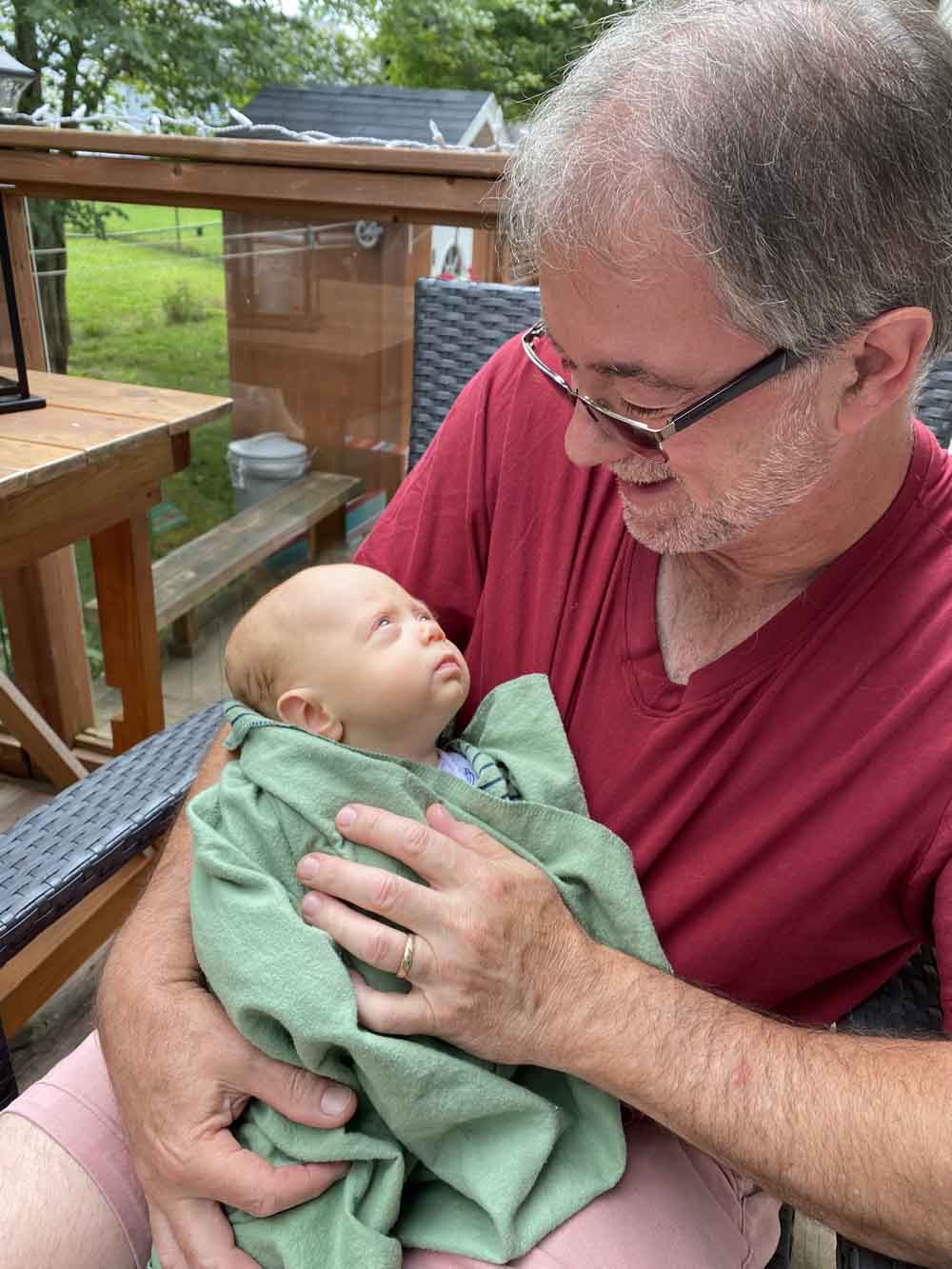
pipes|drums: And Bruce, will you play the new pipes permanently?
Bruce Gandy: I travel quite a bit. If you couple that with being slightly lazy, get the new pipes to do a workshop in Virginia, Chicago or something, then come back out and play them. We’ll play the old pipe to keep it running, and I’ve got an old set of ivory pipes as well that. I’m not super attached to them, but they’re magnificent, and I’ll keep them going a bit until I find a new home for them. I plan to play the new set I’ve got now right to the end. They’re imitation ivory, which I wanted, with black pins, imitation ivory projecting mounts, ferrules, and ring caps for that pure ivory look. I wanted the sound that I could get, and I didn’t want the weight, having had several years of neck and back injuries, so I was thinking of reducing the weight load at the beginning.
It’s time for Alex to have these as well. But that’s kind of it served two purposes. If I can lower the weight, I fully plan on playing them right through now. I see no reason for me to change until I don’t play anymore.
pipes|drums: Hopefully, Bruce, you’ll be playing them for a good long time yet, and Alex we’ll look forward to hearing the new pipes. Good luck with the new instrument. It’s a novel concept, and we wish you all the best with the new Gandy bagpipe from McCallum Bagpipes.
Bruce Gandy: Thanks, it’s gonna be fun.



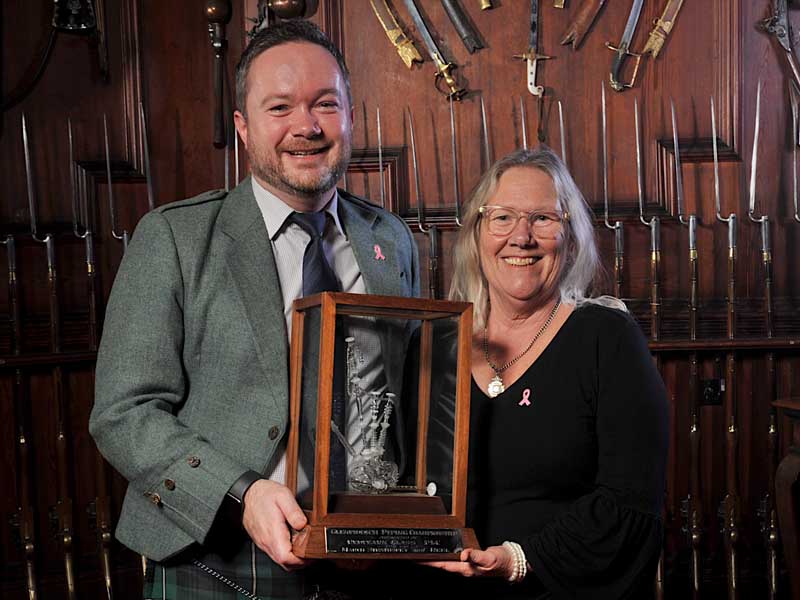

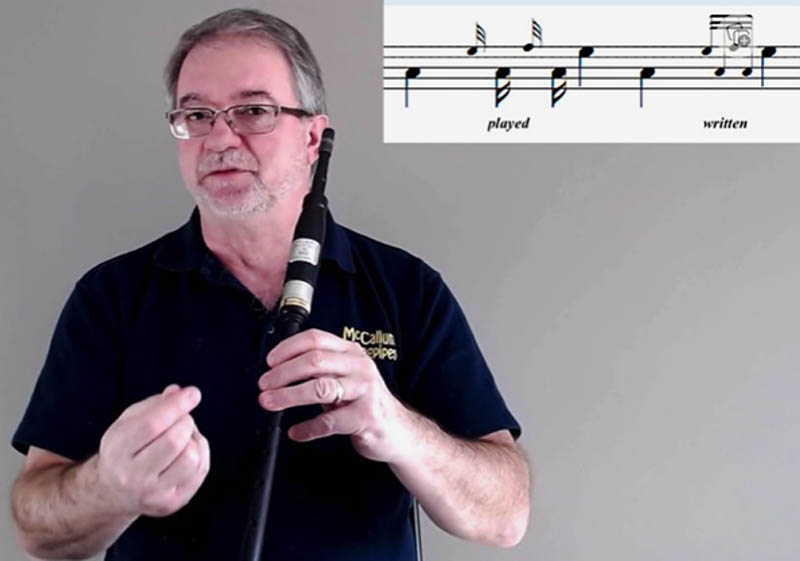
A heartwarming tribute to your Dad and Grandfather Bruce and Alex. After playing my Dad’s Lawrie’s for almost 70 years, I can really appreciate the affection and importance and dedication to quality you both hold for the new Gandy pipes. Good on you for this major achievement in the piping world!
What a great story of being able to share a set of legacy pipes with others; we live in halcyon days with respect to choice of amazing I look forward to hearing a set someday. However, one question begs an answer — who is the original maker of these 1939 pipes?!